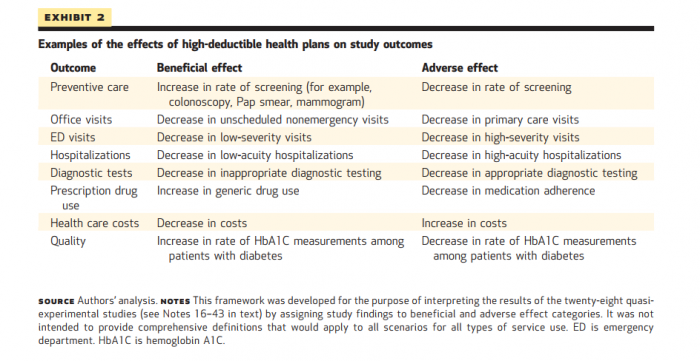High-Deductible Health Plans Reduce Care Costs, Needed Services
High-deductible health plans are proven to reduce care costs, but may also negatively affect necessary healthcare service utilization.

Source: Thinkstock
- High-deductible health plans (HDHPs) may reduce spending, but are also prone to preventing health care consumers from accessing necessary services and recommended preventive care, according to a study published in Health Affairs.
High-deductible plans were associated with a significant reduction in the use of preventive care in seven out of twelve studies analyzed by a team from Indianapolis University and the Center for Health Reform in Dallas. Eight studies found that beneficiaries had first-dollar coverage, which allows HDHPs enrollees to seek preventive care with no cost sharing.
HDHPs were also associated with significant reductions in office visits, and lower utilization of both appropriate and excessive non-emergency care. Three of the studies under review showed large decreases in office visit expenditures, and one study linked a higher rate of HDHP enrollee emergency visits to lower utilization of physician visits and prescription drug treatment.
Another study linked HDHP enrollment with reductions in high-severity ED visits among low-income enrollees.
HDHP enrollees were also found to defer needed hospitalizations, while some HDHP enrollees lowered unnecessary hospital visits.
“One study showed an initial significant reduction in hospitalizations among HDHP members followed by an increase, which suggests that the members initially deferred needed care,” the team added.
The study found reductions in laboratory and diagnostic tests among HDHP beneficiaries, but their analysis couldn’t determine if those reductions were appropriate.
HDHP enrollees had significant reductions in drug spending, and lower prescription drug adherence rates for chronic and low-income beneficiaries.
“One study showed a significant increase in prescription drug use that was driven by an increased likelihood of using generic and essential medications (a beneficial effect), although the use of nonpreferred medications increased as well,” the team said.
The findings from the team suggest that while HDHPs are a popular coverage option, they may cause beneficiaries to focus more on cost savings than on seeking appropriate health care. This is because they have a higher deductibles and higher healthcare spending accountability.
“Enrollees in current HDHPs must meet a relatively large deductible, which encourages them to consider the opportunity costs of choosing between alternative health care options,” the team said.
Most individual HDHPs have deductibles below $2000, while family HDHPs have deductibles just below $4000.

Source: Health Affairs
Payers may want to educate beneficiaries on the importance of using their plans to maintain their health, the study suggested.
“Current evidence on high-deductible health plans suggests that they are associated with lower healthcare costs resulting from a reduction in enrollees’ use of health services,” the team concluded.
“This includes appropriate care, such as recommended preventive services and medication adherence. Our summary of the literature is consistent with existing evidence that demonstrates a decrease in the use of necessary care with increased cost sharing.”
